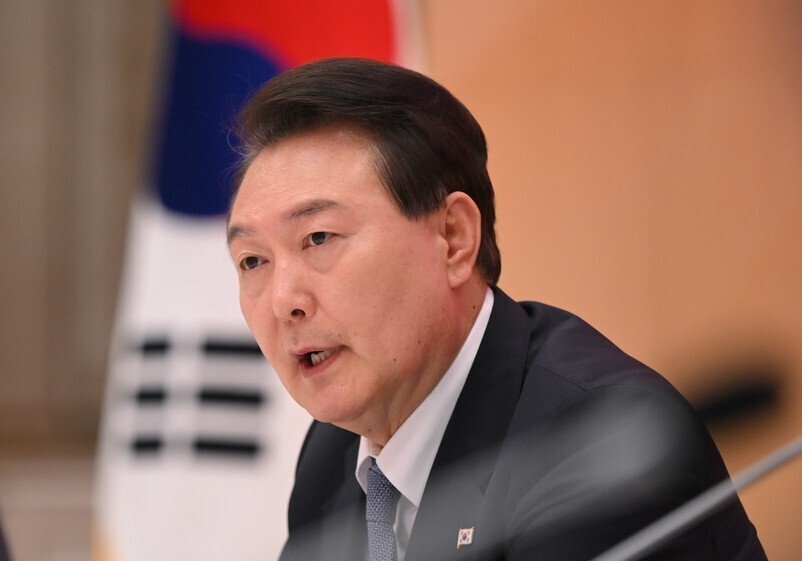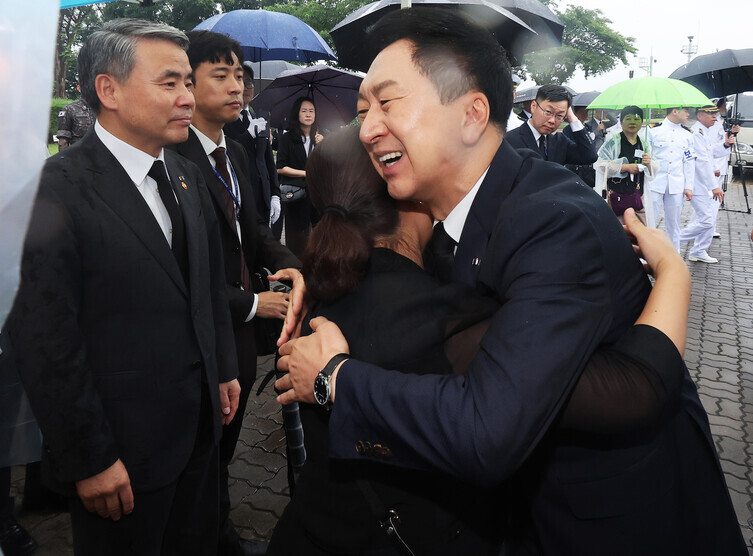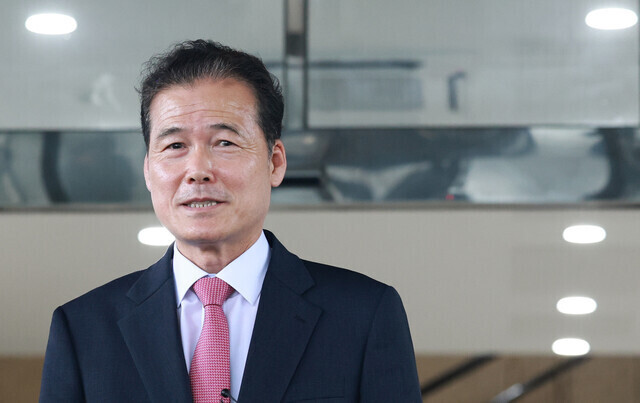hankyoreh
Links to other country sites 다른 나라 사이트 링크
Was Yoon the prosecutor general of “anti-state forces”?

Yoon Suk-yeol is an unusual sort of president — one who is always showing more than one might ever imagine. Indeed, he was the one responsible for generating the hottest piece of political news last week.
During a June 28 ceremony commemorating the establishment of the Korea Freedom Federation (KFF), he denounced his predecessor Moon Jae-in and his Democratic Party administration as “anti-state forces.” In a Cabinet reshuffle on June 29, he tapped Sungshin Women’s University professor Kim Young-ho, someone who has openly called for the “toppling of the Kim Jong-un regime,” as his candidate to run the Ministry of Unification.
These two developments are closely connected, in that they provide clear evidence that Yoon’s values and policy approach are taking a hard lurch to the right. At this point, it doesn’t seem at all out of place to refer to him as the “Ilbe president.” Maybe I’m being too harsh.
Moon’s prosecutor general calls the administration he was appointed by “anti-state”To begin with, we should look at what exactly he said at the KFF event. If possible, I recommend seeking out the full text and reading it for yourself. I’ll focus here on two passages where the content was especially troubling.
“There are far too many people out there who are undermining and threatening a free Republic of Korea and repudiating its national identity, systematically and continuously, through false incitement, fabrications, fake news, and horror stories. And there are far too many people out there who are colluding with them and engaging routinely in anti-state conduct for the sake of money and career advancement.”
“Anti-state forces with a distorted historical understanding and an irresponsible view of the state were prone to demanding that the UN Security Council lift sanctions on the communist gang in North Korea despite its efforts to enhance its nuclear arsenal and kept pushing for an end-of-war declaration that would dissolve the UN Command. The chorus of calls for an end-of-war declaration sought to prevent the automatic activation of the UN Command and its forces in the event of another invasion by North Korea. It was an absurd appeal for a false peace, which would require us to trust the good intentions of the very enemy that conspires to invade us.”
The reason these remarks set off such a firestorm is that they uniformly painted Moon and the Democratic Party administration as “anti-state forces.” Yoon had launched red-baiting attacks on the Democratic Party many times in the past, but he had never referred to Moon or the party as a whole as “anti-state.”

We see an example of this in his remarks during the launch of an election committee for the North Gyeongsang branch of the People Power Party (PPP) on Dec. 29, 2021, when he was a presidential candidate:
“People joined the ranks of the democracy movement after learning left-wing revolutionary ideology and North Korean juche theory, and they have been treated as ‘fighters for democracy,’ surviving by helping one another. Now, under the Moon Jae-in administration, they have been plundering the state and its public.”
Do you notice the difference? In his past statement, Yoon focused his denunciation on a separate group of “left-wingers who had survived by joining the ranks of the democracy movement.” This time around, he is attacking Moon Jae-in and the entire Democracy Party as “anti-state.”
Moon is the one who appointed Yoon as prosecutor general. If Moon and his Democratic Party administration were “anti-state,” that would mean Yoon himself was a key member of those anti-state forces at the time.
Maybe that explains why the PPP’s first response to Yoon’s “anti-state” remarks was to backpedal.
Appearing on the CBS radio program “Kim Hyun-jung’s News Show” on the morning of June 29, PPP lawmaker Ha Tae-keung said, “I’d like it to be made clear that the president’s strong remarks about ‘anti-state forces’ was an expression of concept for national security, not a matter of viewing the previous administration as espionage agents.”
In a closed-door meeting with reporters, senior PPP officials explained that the remarks the president made the day prior concerning “anti-state forces” were “made in consideration of the audience, as the Korea Freedom Foundation is an organization created to defend a free Korea.”
However, party leader Kim Gi-hyeon reacted differently. When asked about Yoon’s comments by reporters after attending a ceremony commemorating the Second Battle of Yeonpyeong, he remarked, “I don’t. understand the backlash from the Democratic Party, as the president’s remarks were based on facts. Telling the people that peace will come to South Korea based on a declaration of the end of the war, which is a mere piece of paper, would be the same as deceiving them.”
When reporters pointed out that calling the opposition an anti-state force is a far cry from crossing the aisle to work together, Kim responded, “If there are forces that deny the identity of South Korea and make the country play right into the hands of the enemy, there is no need to work with them.”
Kim gave no comment when reporters asked if that made the top opposition party an anti-state force.
Park Dae-chul, the PPP’s chief policymaker, also defended the president and his remarks.
“What else should we call those who have been arguing for the lifting of UN Security Council sanctions against the North Korean communist collective that is upgrading its nuclear arsenal, and those who have been harping on about an end-of-war declaration? Loyalists? Patriots?” he asked sarcastically.
The president’s office didn’t respond until late in the afternoon on June 29, when reporters asked for further clarification on the background of the anti-state comments. A presidential office official responded as follows:
“The economy and security are what’s most important. If anything harms our economy, it should be called anti-economy. If anything harms our security, it should be called anti-security. If something manages to harm both of those aspects, it can reasonably be considered anti-state. I don’t think that the president spoke with the last administration or any specific group in mind but was making a general statement. There are security and economic arguments or forces that go against national interest. Another thing to think about is that the nuances of the president’s message change depending on the time, place, and occasion. Whether it’s a press conference, a speech to the National Assembly, a speech to the US Congress, a lecture at the Sorbonne, or a meeting with Vietnamese students, the national message is consistent, but the nuances change. That should be understood. Yesterday was an event by an organization created by people who had the idea of saving the country from anti-security forces right after 1954, so one should think about the background in which that statement was made.”
Do you understand the logic behind this? I don’t.
The logic behind this seems flawed as the speaker is trying to clear up the mess that the president has made. Everything would be so much easier if he just apologized and said, “I went a little too far.” Not doing that makes him even more cowardly.

Kim Young-ho’s open advocacy of unification through absorption
We need to assume that Yoon meant it when he labeled Moon and the Democratic Party as anti-state, as his perception of North Korea and the issue of unification is surprisingly far-right.
In a Cabinet meeting on Thursday, the day after the problematic remarks in question, Yoon named Kim Young-ho, a professor at Sungshin Women’s University, as his nominee for minister of unification.
Kim is a new-right figure who has, on his YouTube channel, openly called for overthrowing the Kim Jong-un regime and forcibly unifying with North Korea by absorption. Appointing someone like this to run the Ministry of Unification is nothing short of declaring Seoul is abandoning inter-Korean dialogue in favor of turning up the heat on North Korea.
During a Cabinet meeting on March 28, Yoon stated the following.
“The Ministry of Unification should stop giving away money to North Korea and make it clear that we won’t give a single penny to North Korea while it pursues the development of nuclear weapons.”
“Investigating the human rights, political, economic and social realities of North Korea through various routes and informing the public at home and abroad is the key roadmap for security and unification.”
When the phrase “won’t give a single penny” caused a commotion, the Ministry of Unification issued a statement to clarify later that day, saying that “there is no change in the current status quo where we provide humanitarian aid.”
At an operational briefing by the Ministry of Unification on Jan. 27, Yoon shared similar thoughts.
“Isn’t it common sense to think that, if North Korea were better off than the South, unification should be centered on North Korea, and if South Korea is much better off, it should be centered on the South’s system?” he asked. “This is why I believe that our neighboring countries, the world, our people, and North Koreans should get to grips with reality as accurately as possible.”
His remarks were clearly meant to imply unification by absorption, which led to an embarrassing situation on Jan. 30, in which Minister of Unification Kwon Young-se appeared on the KBS radio program hosted by Choi Kyeong-yeong to clarify that “unification by absorption is never going to be an option.”
Is Yoon getting his politics from YouTube?Why is Yoon’s mindset increasingly resembling those we see at far-right “taegeukgi troop” rallies? There are two theories we can choose from.
First, the lack of philosophy. As a prosecutor, Yoon was not a man with much of an ideological leaning. There is an analysis that he rapidly shifted to the far right after he declared his presidential candidacy and later acquired biased knowledge on unification, foreign affairs, and security. So far, this is the major theory.
The second theory is based on the assumption that he watches too much far-right YouTube content. The rationale is that Yoon’s statements and logic eerily echo those of far-right YouTubers.
In any case, Yoon’s far-right tendencies and mindsets are likely to cause major problems in the future, fomenting conflict and division in our society. The recent spate of outrageous far-right statements by those who served in Yoon’s administration should be seen as a sign of this.
Kim Kwang-dong, the chairperson of the Truth and Reconciliation Commission, claimed that “compensation for civilian victims of the Korean War is a severe injustice.”
Park In-hwan, chief of the commission on police development, called Moon a “spy.”
Kim Chae-hwan, nominee for the head of the National Human Resources Development Institute, who said that former President Moon Jae-in “basically ordered soldiers to be used as COVID-19 live test subjects by making them take off their masks.”
All these individuals are still proudly standing in their positions.
Why isn’t Yoon removing them and finding replacements? Could it be because he shares the same sentiments? I hope not. What do you think?
By Seong Han-yong, senior editorial writer
Please direct questions or comments to [english@hani.co.kr]

Editorial・opinion
![[Guest essay] Preventing Korean Peninsula from becoming front line of new cold war [Guest essay] Preventing Korean Peninsula from becoming front line of new cold war](https://flexible.img.hani.co.kr/flexible/normal/500/300/imgdb/original/2024/0507/7217150679227807.jpg) [Guest essay] Preventing Korean Peninsula from becoming front line of new cold war
[Guest essay] Preventing Korean Peninsula from becoming front line of new cold war![[Column] The state is back — but is it in business? [Column] The state is back — but is it in business?](https://flexible.img.hani.co.kr/flexible/normal/500/300/imgdb/original/2024/0506/8217149564092725.jpg) [Column] The state is back — but is it in business?
[Column] The state is back — but is it in business?- [Column] Life on our Trisolaris
- [Editorial] Penalties for airing allegations against Korea’s first lady endanger free press
- [Editorial] Yoon must halt procurement of SM-3 interceptor missiles
- [Guest essay] Maybe Korea’s rapid population decline is an opportunity, not a crisis
- [Column] Can Yoon steer diplomacy with Russia, China back on track?
- [Column] Season 2 of special prosecutor probe may be coming to Korea soon
- [Column] Park Geun-hye déjà vu in Yoon Suk-yeol
- [Editorial] New weight of N. Korea’s nuclear threats makes dialogue all the more urgent
Most viewed articles
- 1[Guest essay] Preventing Korean Peninsula from becoming front line of new cold war
- 2Yoon’s broken-compass diplomacy is steering Korea into serving US, Japanese interests
- 360% of young Koreans see no need to have kids after marriage
- 4After 2 years in office, Yoon’s promises of fairness, common sense ring hollow
- 5[Reporter’s notebook] In Min’s world, she’s the artist — and NewJeans is her art
- 6S. Korean first lady likely to face questioning by prosecutors over Dior handbag scandal
- 7AI is catching up with humans at a ‘shocking’ rate
- 8[Column] Why Korea’s hard right is fated to lose
- 9‘Weddingflation’ breaks the bank for Korean couples-to-be
- 10[Column] The state is back — but is it in business?